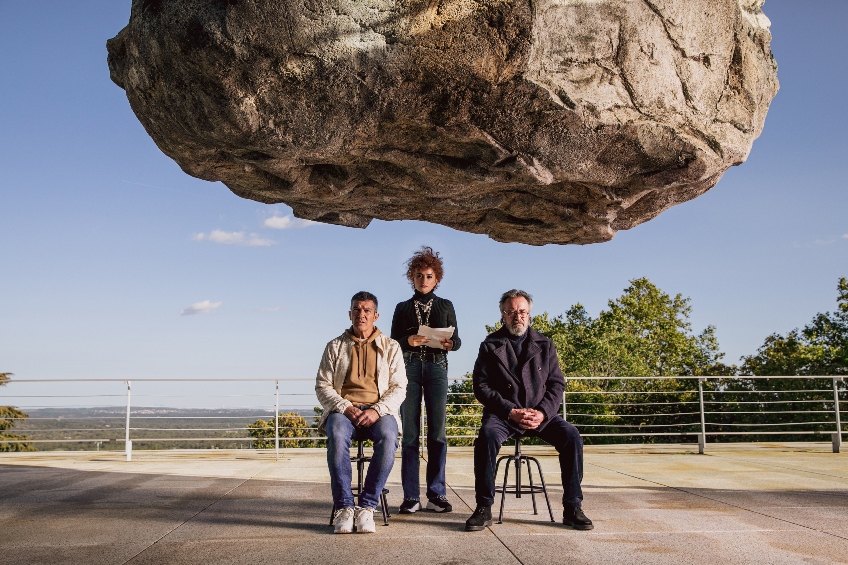Joyce Glasser reviews Official Competition (August 26, 2022) Cert 15, 114 mins
There are dozens of great fictional movies set in the film industry, but only a tiny subset of those are about the making of a film. These include Jean-Luc Godard’s Contempt (1963); Francois Truffaut’s Day for Night (1973; Tom A. DiCillo’s 1995 satire on independent filmmaking, Living in Oblivion, and both Singin’ in the Rain and Michel Hazanavicius’s 2011 adaptation, The Artist, all of which skilfully avoided the pitfalls of the film within a film format.
With their smugly and provocatively entitled Official Competition Argentine filmmaking duo (working in Spain) Gastón Duprat and Mariano Cohn hope to join the select list of films that find a novel way to comment on and send up their industry.
Despite headlining with two of the greatest Hispanic actors alive today, Antonio Banderas and Penélope Cruz, (both splendid in Pedro Almodóvar’s 2019 masterpiece, Pain & Glory), Official Competition falls into the trap that has doomed several contenders. The process of filmmaking is laborious, repetitive, slow and full of boring, self-obsessed egos.
The film opens well, like a spoof on Contempt in which a vulgar American producer hires an acclaimed playwright to adapt the great Fritz Lang’s screen adaptation of The Odyssey. In the promising first shots Humberto Suárez (José Luis Gómez), who was born into poverty and now “feeds ten thousand annually” through the charitable arm of his huge pharmaceutical company, is obsessed with his legacy. He has just turned 80 and stands in his penthouse office confessing to an assistant that he wants to be remembered for something other than being rich. But what? He suggests building a bridge that he would donate to the city. “Or a movie.”
‘You direct a movie?’ gasps his assistant.
‘No, you idiot. I will finance it,’ Suárez retorts, as if financing a film needs less industry knowledge than financing a pharmaceutical industry. And the mogul thinks he has the formula for success.

Suárez pays a fortune for a Nobel prize winning novel that he has not bothered to read, and hires hot, festival winning director Lola Cuevos (Cruz) to adapt, cast and direct it. Cuevas shows up at her meeting with Suárez in a cavernous, stark, modernist bunker that looks like a disused museum, looking like a model who wandered off the cover of Vogue with a huge, long mane of curly hair, dramatic make up and tightfitting, flamboyant clothes of no particular designer.
What Suárez didn’t realise, is that it helps if there is a match between the underlying material and the director’s style. Lola specialises in artsy, experimental fare like Haze or her latest, The Inverted Rain, whereas the novel sounds like a dour, familiar, social-realist saga about two close brothers at war over their love of the same prostitute. Cuevas comes to the meeting armed with a thick book of “notes” that looks like a scrapbook from the archives of a DADA exhibition.
But when matinee idol Félix Rivero (Antonio Banderas), and prestigious theatre actor Iván Torres (Oscar Martinez) arrive for the first session of what is closer to analysis than a rehearsal period, there are only three actors in the film, and Cruise and Banderas keep getting bigger and bigger, until there are really only two. Watching these two great actors take over the screen is the real reason to see the film, not the manner by which they do so.
‘I love the idea of two brothers who are one-half of one person,’ thrills Cuevas at her earlier interview with Suárez, but she focuses more on the wedge between them than their kinship. She has a programme of exercises designed to fuel the competition between the actors.

If you picture Keanu Reeves and Kenneth Branagh as the one-half of the same person, you might imagine they can create the rivalry themselves. Volatile and domineering, Cuevas is hard to read, although both actors try, like children trying to become teacher’s pet.
Rivero, accompanied by a personal assistant, who frequently delivers his “apology” messages – he is frequently late – has three children from four different women. He wants to be seen as a serious actor as well as a movie star and has taken the job for the prestige whereas Ivan, a happily married teacher and theatre actor with one child, hopes to gain fame and an entrée to the big screen.
The tension there is in the film grows from the interplay of the two actors’ conflicting personalities as they compete for Cuevas’s plaudits and vie for the superiority of their acting methodologies. In one scene Rivero announces that he is dying of cancer and may not be able to finish the film. The next few sentences contain a spoiler – of sorts. His act has Cuevas in tears, but the audience might wonder how good a director she can be to believe this distasteful attempt for one-upmanship on Torres, who is genuinely saddened at the news. His reaction nonetheless gives Cuevas an idea. If Rivero cannot complete the project, what about Torres playing both roles?
The film’s satire is not just aimed at acting, but at the rehearsal and directing process, and Cuevas’s intricate exercises, allegedly designed to build trust, empathy and antipathy, are ridiculous enough to be humorous were the scenes not so long and tedious. Are we really meant to laugh at the absurdity of an exercise in which Cuevas has both actors bring in all their awards and then proceeds to pulverise them in a machine? If this is designed to destroy egos or turn vain actors into ordinary brothers, it does not work.




